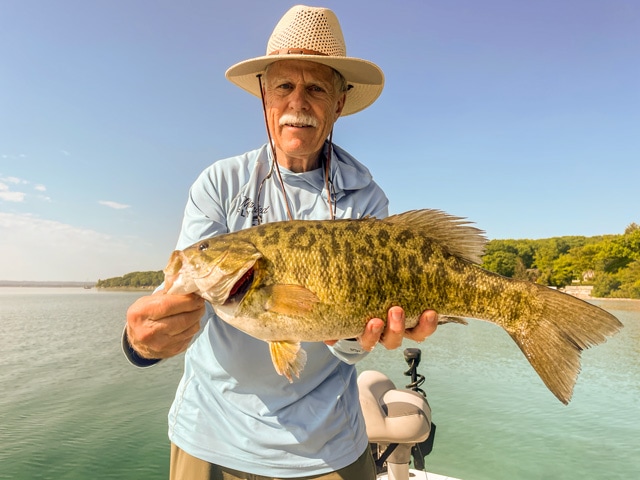Review: Scott Tidal Muskie/Pike Special Rod
Chasing Muskies on the fly isn’t for everyone. Even the gear guys call it the “fish of 10,000 casts” (so, how many false casts is that?). But if it’s your thing, you’ll know pretty quickly. From the first eat, I fell in love. After a couple of years at it, I felt like I was putting the pieces together and wanted my own rig. As a huge fan of Scott fly rods, when the Tidal Muskie/Pike Special was announced, I knew I had my stick and placed my order. Yeah, I know, should have cast it first. But I own a bunch of Scott rods and there’s not a loser in the bunch.
Building on the very successful Tidal series, the Muskie model has a somewhat different taper, as well as an extended fighting butt (more on this later). Scott doesn’t list a line weight rating, but Scott’s Midwest rep, Jerry Darkes, told me it was rated as a 10/11 weight.
First impressions were exactly what I’ve come to expect from Scott – tight wraps, their beautiful unsanded blank, and solid, but not flashy hardware. If you need bling, these guys aren’t your company. But let’s be real – if you need bling, you’re not fly fishing for Muskie.
Last weekend I got to get in my first real outing chasing ski’s with my new stick. This was my annual pilgrimage north with Capt. Jon Ray and my Dad. JR pulled us into this crazy pursuit a couple of years back and Dad and I both took to it right away (he boated a 40″ that first year). This year I was armed with my new stick, a fresh Scientific Anglers Mastery Wet Tip Express 350 grain sink tip line, and a STUNNING Abel Super 9/10N in Muskie graphics.
The first thing I noticed when casting is that this thing is a cannon – launching a big fly and a heavy line a long distance is no problem. Back cast, wait for the load, and WHAM! But more importantly for me was accuracy. I found I could sidearm under overhanging tree limbs, hit kill holes, and generally put the fly where I wanted it with tremendous ease. As I said to Jon – “this rod casts better than I do…”. The morning of the first day we encountered some pretty serious wind and the Tidal really helped. Just by tightening up my loops I was able to maintain the control I needed. Even backhand casts gave me the same feeling of power and accuracy.
The extended fighting butt is another huge advantage. I’ve heard experienced guides say that up to 50% of their fish came from figure-eights at the boat. But figure-eighting all day is physically exhausting. The extended fighting butt enabled me to add a two-hand grip that increased rod control and gave my casting hand a break. At a recent lecture by Muskie guru Blane Chocklett, I learned another use – casting. By locking the extended but to your forearm, you spread the load out, making it easier to throw heavy flies all day. Sure enough – it works!
On the afternoon of our first day, I got to test the fighting prowess of the Tidal Muskie. We’d just moved the boat up river to a new area. On my second cast I see the perfect eat. This big girl just engulfed my fly. A hard strip-set and it’s ON! The fight is an area where this rod shines. I had plenty of power to direct the fish, gain line, and generally control the fight. The rod flexes deep to the cork without a moan, groan, or complaint. A little deft network from JR and I’m on the board!
With my other Scott rods, particularly streamer rods, I’ve found one small issue. You have to tape the ferrules. It’s the same on my Scott Radian 907/4 which I use streamer fishing for trout and smallmouth bass. If you don’t tape the ferrules, they loosen, the rod casts like pooh, and you run a greater risk of breaking a rod. I find that if I wax the ferrules once, and then tape with every use, it’s all good. A minor drawback for an outstanding rod.
If you’re looking for a great Muskie rod at a moderate price, I highly recommend the Scott Tidal Muskie/Pike Special. A solid value on a great performing rod that’s made in the U.S.A.
-Sean-




Comments are closed.